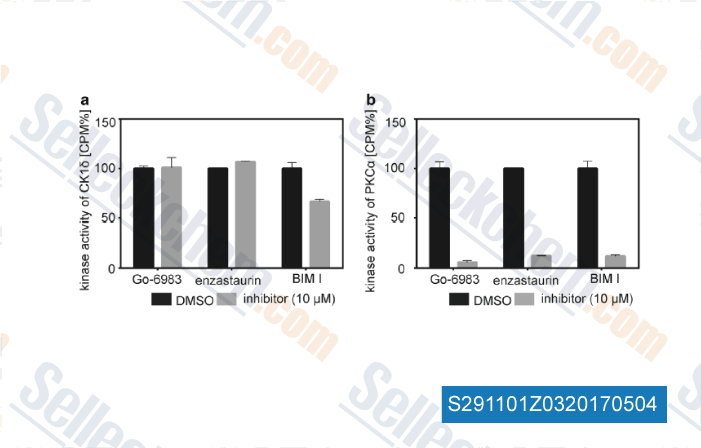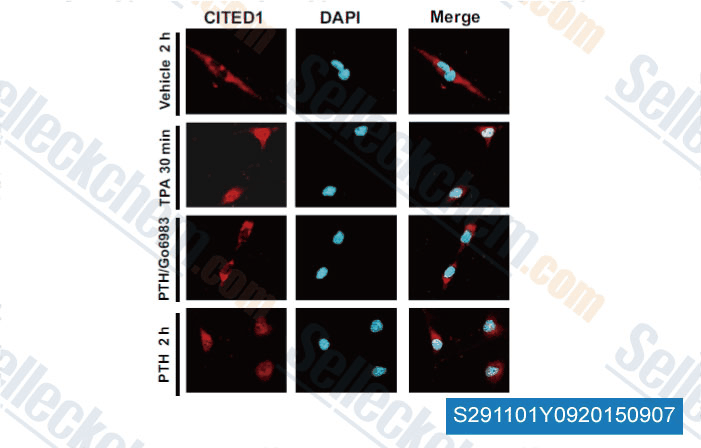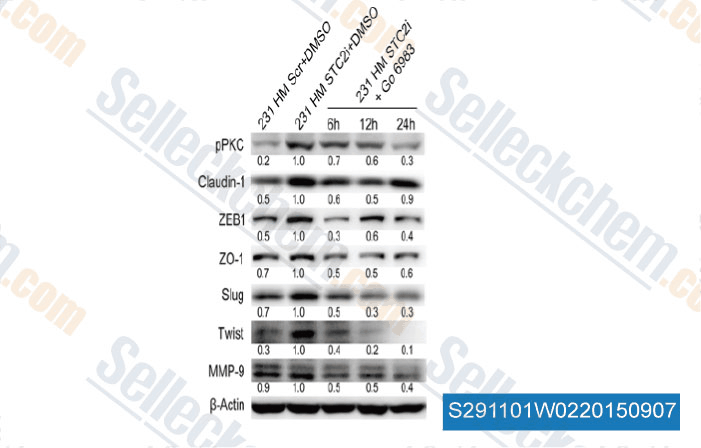|
Toll Free: (877) 796-6397 -- USA and Canada only -- |
Fax: +1-832-582-8590 Orders: +1-832-582-8158 |
Tech Support: +1-832-582-8158 Ext:3 Please provide your Order Number in the email. |
Technical Data
| Formula | C26H26N4O3 |
|||
| Molecular Weight | 442.51 | CAS No. | 133053-19-7 | |
| Solubility (25°C)* | In vitro | DMSO | 59 mg/mL (133.33 mM) | |
| Water | Insoluble | |||
| Ethanol | Insoluble | |||
|
* <1 mg/ml means slightly soluble or insoluble. * Please note that Selleck tests the solubility of all compounds in-house, and the actual solubility may differ slightly from published values. This is normal and is due to slight batch-to-batch variations. * Room temperature shipping (Stability testing shows this product can be shipped without any cooling measures.) |
||||
Preparing Stock Solutions
Biological Activity
| Description | Go 6983 (GOE 6983, Gö 6983) is a pan-PKC inhibitor against for PKCα, PKCβ, PKCγ and PKCδ with IC50 of 7 nM, 7 nM, 6 nM and 10 nM, respectively; less potent to PKCζ and inactive to PKCμ. | ||||||||||
|---|---|---|---|---|---|---|---|---|---|---|---|
| Targets |
|
||||||||||
| In vitro | Go 6983 (300 μM) suppresses PKCμ auto-phosphorylation by 20% reduction in NIH3T3 transfected with PKCμ. [1] In hearts reperfused with PMNs and Gö 6983 (100 nM), left ventricular developed pressure (LVDP) and the rate of LVDP recoveres to 89% and 74% of baseline values, respectively, significantly higher than PMNs alone. Gö 6983 (100 nM) significantly reduces PMNs adherence to the endothelium and infiltration into the myocardium compared with Ischemia followed by reperfusion (I/R)+ PMN hearts, and significantly inhibits superoxide release from PMNs by 90%. Gö 6983 attenuates post-I/R cardiac contractile dysfunction in the presence of PMNs, which may be related in part to decreased superoxide production. [2] Gö 6983 significantly inhibits antigen-induced superoxide release from leukocytes of patients previously sensitized to tree pollen. Go 6983 inhibited intracellular Ca(2+) accumulation in human vascular tissue, suggesting a mechanism for its vasodilator properties. [3] Go-6983 (1 μM) combined with Ro-31-8425 (390 nM) slightly inhibits Angiotensin II–induced PLD2 activity in PGSMCs. [4] Go 6983 is isoform-specific PKC inhibitor that target the ATP binding site. Go 6983 inhibits ΔPfPKB activity with an IC50 of 1 μM. In Go 6983 (5 μM)-treated cells, the number of rings in the following cycle is markedly less compared with the control cultures. Go 6983 (5 μM) treatment results in an almost 60% decrease in formation of new rings in P. falciparum cultures. [5] |
||||||||||
| In vivo | Go6983 (22.0 μg/mouse, i.v.) strongly inhibits tumor metastasis by 51.2 % in a mouse pulmonary B16BL6 tumor model. [6] |
Protocol (from reference)
| Kinase Assay: |
|
|---|---|
| Animal Study: |
|
References
Customer Product Validation

-
Data from [Data independently produced by , , Amino Acids, 2016, 48(5):1185-97]

-
Data from [Data independently produced by , , Cellular Signalling, 2014, 26(11): 2436-2445]

-
Data from [Data independently produced by , , PLoS One, 2015, 10(4): e0122179 ]
Selleck's Go 6983 has been cited by 93 publications
| Caragana jubata ethanol extract ameliorates the symptoms of STZ-HFD-induced T2DM mice by PKC/GLUT4 pathway [ J Ethnopharmacol, 2025, 339:119171] | PubMed: 39613004 |
| Experimental study on small molecule combinations inducing reprogramming of rat fibroblasts into functional neurons [ Zhejiang Da Xue Xue Bao Yi Xue Ban, 2024, 53(4):498-508] | PubMed: 39183062 |
| High-throughput chemogenetic drug screening reveals PKC-RhoA/PKN as a targetable signaling vulnerability in GNAQ-driven uveal melanoma [ Cell Rep Med, 2023, 10.1016/j.xcrm.2023.101244] | PubMed: 37858338 |
| Alternative splicing of HDAC7 regulates its interaction with 14-3-3 proteins to alter histone marks and target gene expression [ Cell Rep, 2023, 42(3):112273] | PubMed: 36933216 |
| PTH regulates osteogenesis and suppresses adipogenesis through Zfp467 in a feed-forward, PTH1R-cyclic AMP-dependent manner [ Elife, 2023, 12e83345] | PubMed: 37159501 |
| The biased M3 mAChR ligand PD 102807 mediates qualitatively distinct signaling to regulate airway smooth muscle phenotype [ J Biol Chem, 2023, 299(10):105209] | PubMed: 37660916 |
| Histamine promotes angiogenesis through a histamine H1 receptor-PKC-VEGF-mediated pathway in human endothelial cells [ J Pharmacol Sci, 2023, 151(4):177-186] | PubMed: 36925216 |
| PKCβII phosphorylates ACSL4 to amplify lipid peroxidation to induce ferroptosis [ Nat Cell Biol, 2022, 24(1):88-98] | PubMed: 35027735 |
| Alternative splicing of apoptosis genes promotes human T cell survival [ Elife, 2022, 11e80953] | PubMed: 36264057 |
| Nucleosome remodeling and deacetylation complex and MBD3 influence mouse embryonic stem cell naïve pluripotency under inhibition of protein kinase C [ Cell Death Discov, 2022, 8(1):344] | PubMed: 35915078 |
RETURN POLICY
Selleck Chemical’s Unconditional Return Policy ensures a smooth online shopping experience for our customers. If you are in any way unsatisfied with your purchase, you may return any item(s) within 7 days of receiving it. In the event of product quality issues, either protocol related or product related problems, you may return any item(s) within 365 days from the original purchase date. Please follow the instructions below when returning products.
SHIPPING AND STORAGE
Selleck products are transported at room temperature. If you receive the product at room temperature, please rest assured, the Selleck Quality Inspection Department has conducted experiments to verify that the normal temperature placement of one month will not affect the biological activity of powder products. After collecting, please store the product according to the requirements described in the datasheet. Most Selleck products are stable under the recommended conditions.
NOT FOR HUMAN, VETERINARY DIAGNOSTIC OR THERAPEUTIC USE.
